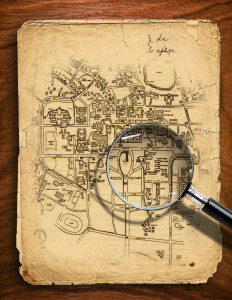
One hundred ten years ago this month, Jane Lathrop Stanford died of strychnine poisoning. Since then, the circumstances of her apparent murder have not been fully fleshed out — until now. Or so claims an anonymous clue-giving texter behind what could be the largest sleuthing game in campus history.
The texting entity calling itself the Stanford Mystery Society (SMS) has been around for at least a year, sending out clues in the form of brain teasers and riddles that seemingly lead to solving a mystery. Whatever the end result might be, various clues have indicated that the SMS aims to reveal information about Stanford’s history, including that of Jane Stanford’s death, to those “agents” who are most persistent in the game by scouting out and decoding the clues. According to the website of ReDesigning Theater, which is part of Stanford’s design program, that worked with the SMS on one of its projects, the organization was founded, in 1974, long before the rise of the cell phone, “following mysterious circumstances on campus.”
To join the society, one must be nominated or contact the SMS via its website. After filling out an interest survey, potential detectives receive their first clue, telling them where to find a “key” that will indicate their new code name.
A freshman who requested only to be identified as Agent Packardson went with some friends to locate the box of keys in early January.
“We went there at like 12 at night so it was kind of spooky,” he said.
One of Packardson’s friends, who spoke on the condition of anonymity, immediately responded to the nomination text message and signed up.
“It was a little bit sketchy at first,” the friend said, referring to the initial messages. “I was just like, somebody’s pranking me, but it’s not a bad prank honestly. I like it. I was into that.”
Even after following a few clues, however, she still has her doubts. She said she thinks the whole thing could be a psychological experiment.
“I just think this is really nice,” she said. “I don’t expect to go into here solving a murder. It’s just for fun and I think they’re doing a good job of it. It’s very intriguing.”
The first enigma she had to solve was from the program of Jane Lathrop Stanford’s funeral.
“A few letters were circled, and it was sort of odd,” she said. “And there was some lines for you to fill in. And from there, we were supposed to decode what those letters meant.”
After a bit of help from her fellow sleuths, she found a lead.
“Turns out these were all elements in the periodic table,” she said. “When you find out that it’s an element, you can go from there and find the atomic numbers of all those, and those atomic numbers make coordinate[s] which personally I thought was really cool.”
The coordinates led the team to an old building where they found their next clue. Clue after clue, these mystery men and women search. But what of it?
“In the end of it I feel like it’s supposed to be one grand meeting,” she said. “I feel like at the end they’re going to put everyone who has been able to get up to a certain point together, and I bet they’d make you meet each other. I don’t know if I will get that far, but I have a feeling that people will.”
An in-person meeting for SMS members would not be unprecedented, as ReDesigning Theater’s 2013 project analyzing a “multi-level audience” brought dozens of agents together for an interactive performance.
The SMS seems to have strong ties to ReDesigning Theater. The project website mentions in its “next steps” section that the SMS is funded by a ReDesigning Theater Seed Grant.
“It is kind of fun; it is a mystery,” Packardson said. “You don’t know who’s putting this on, you don’t know how long it will go. And it’s not like creepy or anything in the sense that like none of us feel like we’re going to be in any danger going there, we’re all going with friends. So it’s just a fun diversion from the normal Stanford grind.”
Details of clue whereabouts and some solutions have been intentionally withheld from this report by request of the agent behind the text messaging system, whose identity will, for now, remain a mystery.
An earlier version of this article incorrectly said that Stanford died one hundred years ago this month. She actually died in 1905 rather than 1915. We apologize for this error.
Contact Tristan Vanech at tvanech ‘at’ stanford.edu.